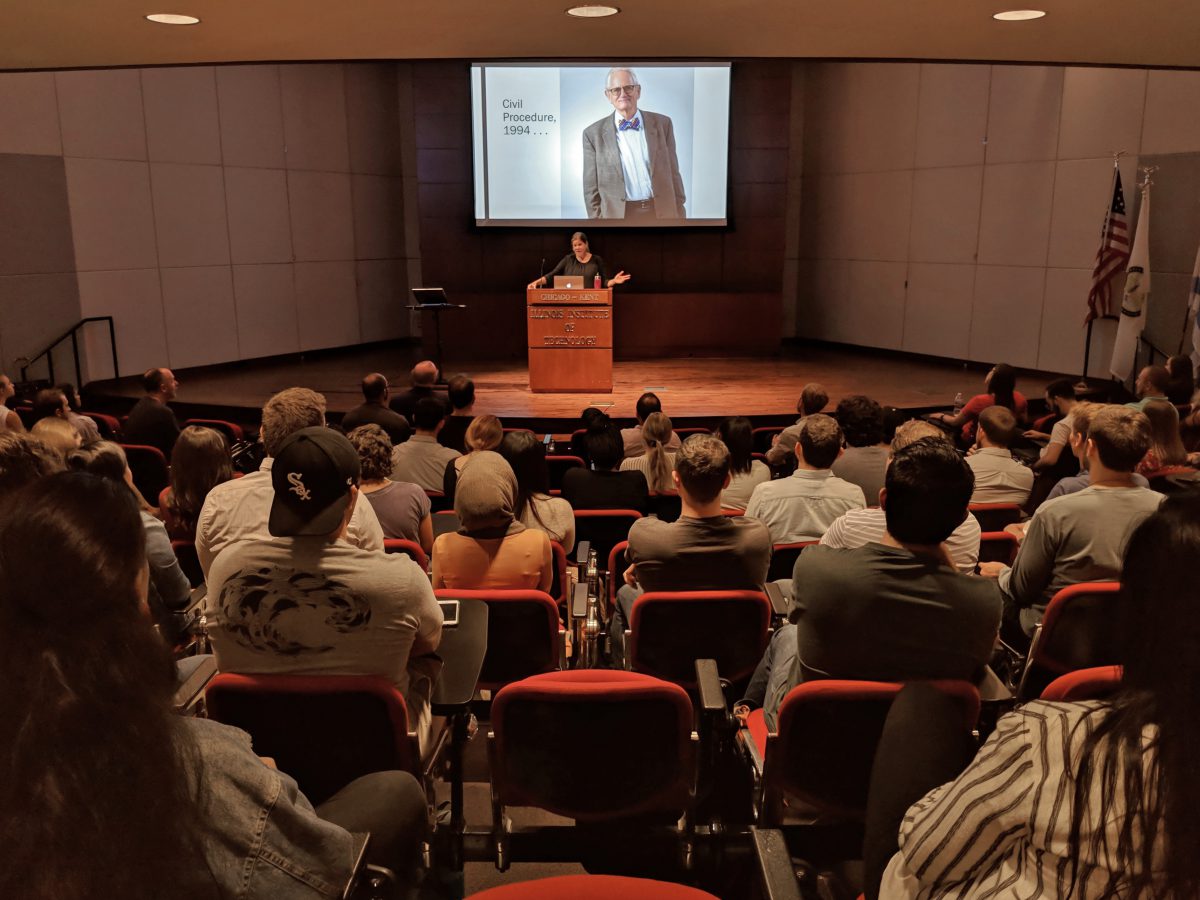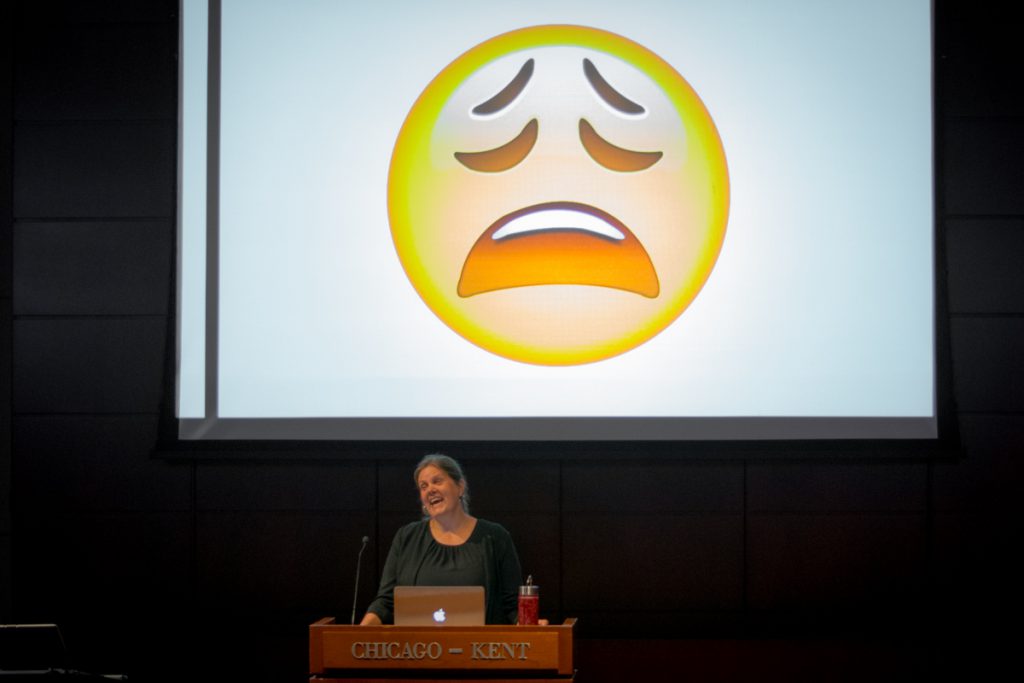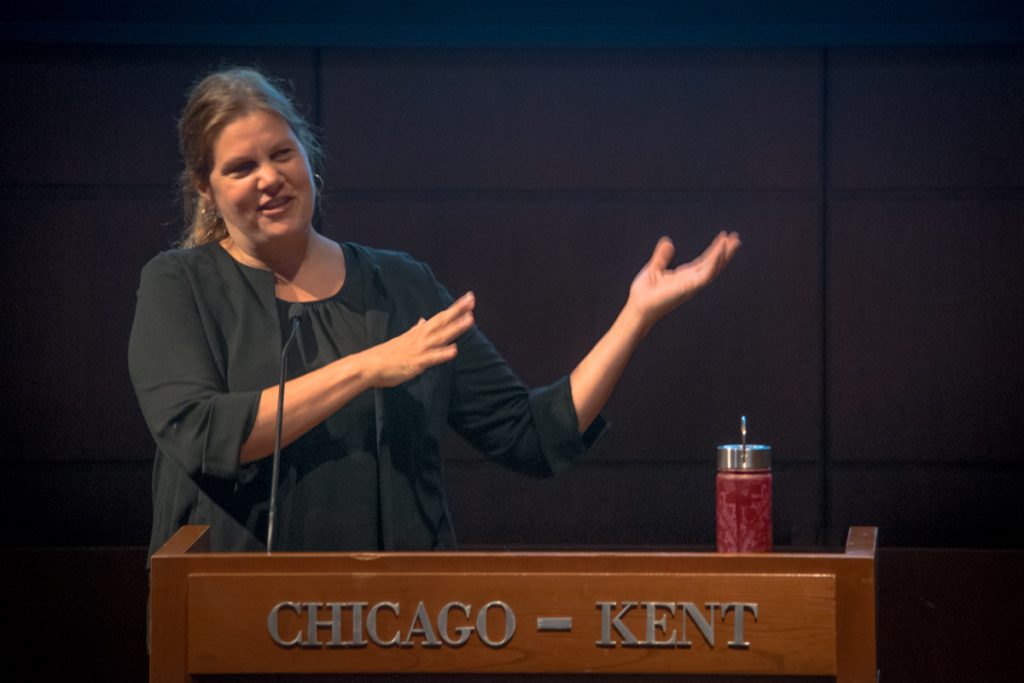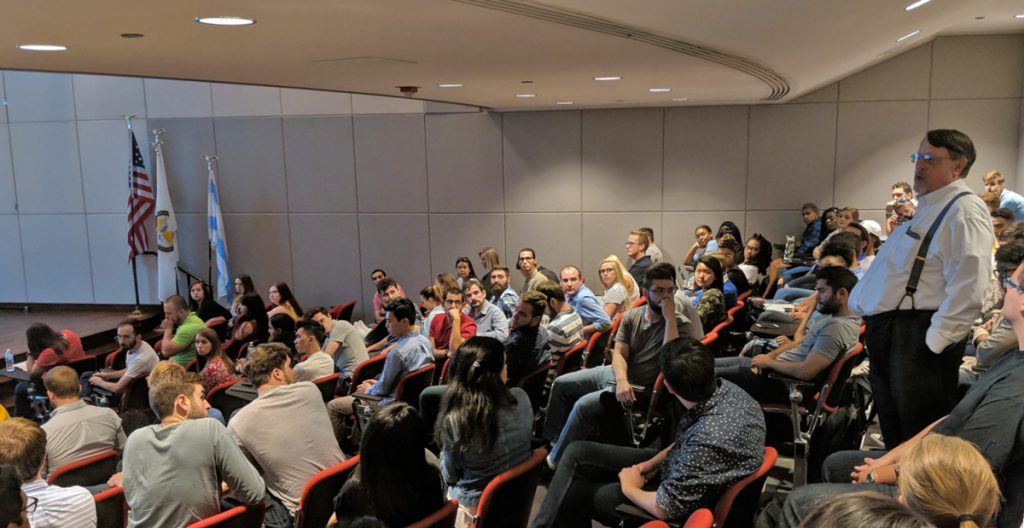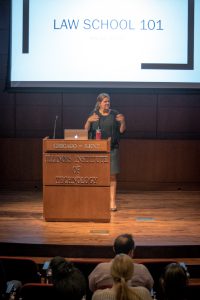 On Wednesday, August 22, Professor Kari Johnson shared some of the struggles she faced in her 1L year with the newest entering class of Chicago-Kent students at our 2018 Orientation.
On Wednesday, August 22, Professor Kari Johnson shared some of the struggles she faced in her 1L year with the newest entering class of Chicago-Kent students at our 2018 Orientation.
Then Professor Johnson reflected on her story to point to specific study strategies that would have helped her succeed.
Her study plan resource and Q&A with students are also included in this recap.
Looking back at 1L experience
Professor Johnson started with the story of her 1L Civil Procedure class. Her frustration started when she couldn’t see the point of the class:
I had many problems with Civil Procedure. First, I didn’t understand why I needed it. I understood why a lawyer needed to learn about crimes and contracts and property laws and all the rest of my 1L classes. But I could not for the life of me understand why it mattered SO VERY MUCH to Professor Park who lived where, with what kind of minimum contacts they had to other places. Or whether some mysterious veil had been pierced or not pierced. These things made no sense to me. I couldn’t connect them to anything I recognized as “the law.”
As the class went on, she realized she wasn’t getting cold-called as often, probably due to her seat. She started skimping on her class preparation, skimming through the readings and tuning out much of the discussion.
When it came time for the exam, she crammed and created a long, detailed outline. She felt good about her study time, since she had never received a grade lower than a B before. Then she was shocked to find it didn’t help: she got a C-.
Lessons Learned:
Why tell that story? She said there were three lessons she wants students to remember:
- You will fail in law school
- You will survive failure in law school
- Learning to leverage failure is key to success in law school
Do grades matter?
Professor Johnson noted:
There are many paths into this challenging and vibrant profession, and you will be able to carve one out. It’s true that a high GPA opens doors, but so do great people skills, demonstrated work ethic, glowing references from a professor who saw you do something impressive, outstanding commitment to public interest issues, and on and on. The GPA route is NOT the only route into the profession.
What can you do to succeed?
Taking a second look at her story of personal failure, Professor Johnson pointed out several “red flags” that she could have seen earlier and corrected to get a better result in her class.
???? Red Flag #1: Didn’t understand the reading
Part of her frustration in Civ. Pro was her lack of context. Not coming from a family or social context with a legal background, these were new concepts for her. She never stopped to ask if she was learning when it got hard:
Had I ever asked myself if I was getting it, the honest answer would have been NO. I could have started to do better then, when it could have helped me.
If you don’t know why a class matters, she encourages students to see this as a sign to slow down and work harder. It’s much better to read to comprehend than to skim.
Lesson: Cocky and passive is a bad combination.
???? Red Flag #2: Squandering In-Class Time
With an expectation that she was waiting for the professor to share rules in class, she felt lost when she was waiting for answers and didn’t participate in the Socratic dialogue.
Why do law professors use the Socratic method? Because lawyering is long on questions, short on explanations. Learning the law is not about memorizing a set of rules, because they are always changing!
You will learn the black letter law, but that is just the starting point. What do you do with it? Pulling rules out of cases is not as simple as it sounds, and then you have to use them:
A rule is never the end of your work as a lawyer—it is only the beginning. It’s what you do with that rule that matters.
Participating in the class discussion will challenge your understanding and help you practice applying rules to new facts. She encourages students to start by answering questions to themselves and start raising their hands in class if they aren’t called on.
Lesson: Lost and passive is a bad combination.
???? Red Flag #3: Studying badly
A lot of the study techniques students use in college are rereading and cramming. It can help provide an “I got this” feeling, but that feeling isn’t an accurate way to judge whether you’re prepared for an exam.
Professor Johnson noted that she’s been researching how the learning process works so faculty at Chicago-Kent can support our students in becoming effective learners.
The time you spend learning how to be a better learner will repay you tenfold throughout law school and into your careers because, indeed, lawyers never stop learning the law!
The most effective ways to learn the material well require doing the hard things. Start early with active study strategies, organize notes into an outline from the beginning to see the patterns and relationships in the topics, do consistent self testing, and take breaks to try different topics or approaches rather than cramming.
Lesson: If it feels easy, it’s probably not working!
Resource:
Professor Johnson encouraged students to review the study plan sent out by the legal writing professors to all students:
It spells out more thoroughly than I can, here, what works and what doesn’t work when it comes to learning the law.
- Guide: 1L Fall Study Plan
Professor Johnson’s Conclusion:
Instead of focusing on your grades, I suggest you focus on something more interesting and vibrant: your future clients. You are here for them!
No matter your GPA, if you work hard in law school, you will acquire a set of skills that very few have, a set of skills that allows you to enter people’s lives and create powerful change for the better.
Lawyers help the mentally ill when they get trapped in prison rather than in treatment where they belong. Lawyers write small businesses into being, and shepherd them through obstacles that arise. Lawyers preside over the rearrangement of families facing divorce, and can make that process less harmful. Lawyers advise and write laws that keep society safe and functional. Lawyers craft wills that facilitate critical end-of-life decisions. Lawyers get remedies for the injured, and prevent people from abusing others, or the law itself.
Name a serious problem and chances are lawyers are uniquely equipped to work on it.
Audience Q&A
After Professor Johnson’s presentation, she opened up the discussion for questions from the students:
Q: What should you bring with you to office hours if you’re having trouble in class?
A: It helps if you’ve done thoughtful reading already so you can bring in the specific issues you’re struggling with. But start by not being afraid!
Q: How does the curve work?
A: Professor Johnson deferred to Dean Sowle for this answer, who noted that there’s more information available in the Student Handbook (§ 6.8 -Grading Curves).
The curve is mandatory for required doctrinal classes, not legal writing classes. This is a great opportunity for you—especially because employers may place extra weight on your legal writing grade. Take advantage and work hard in legal writing! Elective courses are not automatically subject to the curve, though large electives of 40+ are recommended to use it.
Q: What questions should I ask myself to make sure I’m learning?
A: What are the big things I want to remember? How can I put the top points into the form of a question and go back to them later to make sure I remember how to use them? Use your TA, use each other to test your knowledge.
Q: If courses list additional sources but I want to save money, what should I do?
A: Look at the books in person to see if they seem useful. and talk to your professor to see why they recommended it. You can also stop by the student resource library in student services to find the books there.
Also, don’t limit yourself to learning the topic the way your professor teaches it. Start by learning their way, but be open to trying study guides. Sometimes, encountering a new articulation of a concept leads to better understanding.
Resource: CALI Lessons are interactive tutorials available to Chicago-Kent students on a broad range of topics. Stop by the library to learn how to set up your account if you haven’t already!
Q: Can I find exams to use for self study?
A: The library hosts the Chicago-Kent Exam Database. Not all courses and faculty include their exams, but you can find ones by other professors if your prof doesn’t have one.
Dean Sowle noted this is a great resource for later in the semester and said “Don’t freak yourself out by looking at it before you get started with the classes, though!”

